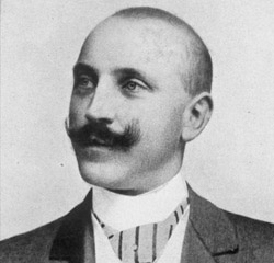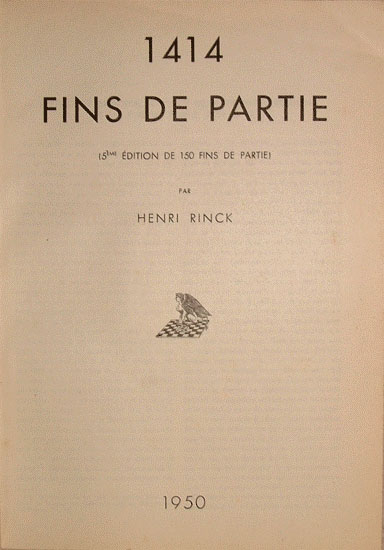


Endgame Turbo 5 USB flash drive
Perfect endgame analysis and a huge increase in engine performance: Get it with the new Endgame Turbo 5! This brings the full 6-piece Syzygy endgame tablebases on a pendrive. Just plug it in a USB socket and you are set!
We have already shortly talked about Henri Rinck a year ago in our “Rocking Rooks” article, but this time a more extensive view has to be taken. Of course, it isn’t always possible to write as extensive an article as last month, and some information — such as the taste of the Rinck beer which is unconveyable in any written form — is lost over time. Oh, how much could be said about beer, about how it might have been essential even for the invention of chess, as without beer there might have been no agriculture, no housing. One theory at least, shown in the documentary “How Beer Saved the World” from 2011, says that humans grew crops after it accidentally rained into a grain pot, and the resulting liquid just gave the impulse to cultivate grains and crops to create more of this delicious energy source...beer! It was used as food, as a currency, even as medicine throughout the ages, being essential in creating civilization, building pyramids, making ancient Egypt a world power. Far more than the drink known today, beer has a tradition as long as civilization itself, that theory alleges. So the Rinck family might indeed have worked in the oldest kind of manufacturing industry of the world. Some studies attribute various health benefits to moderate amounts of beer, but you should always consult your medical doctor for further information on health topics.
 Not much is found on the internet about Henri Rinck as a person, but a lot about his compositions. The French website “Heritage des Echecs Francais” shows two photos of Rinck, one where he has the typical look of his era, complete with shaved head and what we’d consider a funny beard today, and another where he looks more like an ageing politician. The same website offers a French article from Le Temps of July 30th, 1930, about Henri Rinck, as written by the endgame theoretician and composer André Chéron whose “Lehr- und Handbuch der Endspiele” would become a standard work of chess endgame literature later.
Not much is found on the internet about Henri Rinck as a person, but a lot about his compositions. The French website “Heritage des Echecs Francais” shows two photos of Rinck, one where he has the typical look of his era, complete with shaved head and what we’d consider a funny beard today, and another where he looks more like an ageing politician. The same website offers a French article from Le Temps of July 30th, 1930, about Henri Rinck, as written by the endgame theoretician and composer André Chéron whose “Lehr- und Handbuch der Endspiele” would become a standard work of chess endgame literature later.
Chéron details Rinck being born on January 10th, 1870 into an established family of beer brewers. According to that, they had a “brasserie”, which might be a brewery with or without a tavern, as that word could be translated into both meanings. EG 102, Part 2 (May 1990) has a Rinck “120 years” memorial article by Roland Lecomte, clearing that it means the breweries(!) at the Cours du Midi (later Cours Verdun) Little Henri, however, did not follow those footsteps, graduating at the “Technische Hochschule” (“Technical College”, nowadays the “Technical University”) in Munich. Afterwards, he worked at the “Faculté des Sciences” (“Faculty of Science”) in Lyon as an assistant of Prof. Philippe Barbier. Afterwards, he contributed to the Rinck properties in the Rhone department.
Rinck discovered — as a by-product of work on chlorophyll — a refining process for vegetable oil in 1897. In 1900, Rinck moved to Barcelona where he mainly applied the process, after having it already applied in olive oil manufacturies in Marseille earlier. In this city he remained for most of the rest of his life, only leaving once when being forced to after the end of the Spanish Civil War. According to my sources, he died in Badalona, not Barcelona, after a short but painful illness. Badalona is to the immediate north-east of Barcelona, so possibly Rinck was in a hospital there, but my sources are silent about that.
Badalona, on the Catalonian coast northeast of Barcelona
Rinck, learning chess at 16, was champion of Lyon, winning a two-game match against the combined players of the Algiers chess club. The French Defense and games by Muzio and Kieseritzky were analysed by Rinck, published in “La Stratégie” in 1890. But only in Spain, influenced by his friends Jos Tolosa y Carrera and Valentin Marin Rinck started composing...two-movers.
 Turning to endgame studies, he showed absolute purity, of which the bishop chase in study 1 is a good example. The excellent work of Rinck amounted to 190 major honors in 102 competitions, but much more to his book series, first published in 1907 with “150 fins de partie” and finished by holding the first copy, on 11 February 1952, six days prior to his death only, of “1414 fins de partie” (“1414 Endgames”, but consisting of 1414 endgame studies by Rinck) in his hands, printed on January 10th, 1852, Rinck’s 82nd birthday in 500 copies. The book was a labour of love even from the typesetter, a Benedictine monk who set it all by hand! The success of the book, which was dedicated to Rinck’s nephew Jacques Rinck of Lyon, might have been underestimated, as it was sold out immediately.
Turning to endgame studies, he showed absolute purity, of which the bishop chase in study 1 is a good example. The excellent work of Rinck amounted to 190 major honors in 102 competitions, but much more to his book series, first published in 1907 with “150 fins de partie” and finished by holding the first copy, on 11 February 1952, six days prior to his death only, of “1414 fins de partie” (“1414 Endgames”, but consisting of 1414 endgame studies by Rinck) in his hands, printed on January 10th, 1852, Rinck’s 82nd birthday in 500 copies. The book was a labour of love even from the typesetter, a Benedictine monk who set it all by hand! The success of the book, which was dedicated to Rinck’s nephew Jacques Rinck of Lyon, might have been underestimated, as it was sold out immediately.
It is deeply presumptuous to try giving an objective selection of the best studies of a man like Rinck, called one of the three whales of modern chess composition by Halberstadt (with Kling & Horwitz and Troitzky). So the selection here can only be of some personal favourites and otherwise beautiful works with no aspiration of even partially completely being able to show Rinck’s wide range of ideas.
Still, I hope readers will be able to enjoy them!
The "Mega" is the database every serious chessplayer needs. The database contains 7.1 million games from 1500 to 2017, in highest quality standard, full of top level analyses and completely classified.
You probably know that you can move pieces on our replay boards to analyse and even start an engine to help you. You can maximize the replayer, auto-play, flip the board and even change the piece style in the bar below the board.
At the bottom of the notation window on the right there are buttons for editing (delete, promote, cut lines, unannotate, undo, redo) save, play out the position against Fritz and even embed the ChessBase game viewer on your website or blog. Hovering the mouse over any button will show you its function.

World Federation for Chess Composition (www.wfcc.ch)